 We Walk This Road (Warner Brothers), the
latest release from Robert Randolph and the
Family Band, is a different animal from the
band’s previous three releases. The first thing
you’ll notice is that the manic energy and intensity
that permeated the group’s debut, Live At The
Wetlands (and was present in varying degrees in
their subsequent albums, Unclassified and
Colorblind), has been, shall we say,
redistributed and refocused in a way that might
initially put off some of his longtime fans who
might be expecting more of the same.
We Walk This Road (Warner Brothers), the
latest release from Robert Randolph and the
Family Band, is a different animal from the
band’s previous three releases. The first thing
you’ll notice is that the manic energy and intensity
that permeated the group’s debut, Live At The
Wetlands (and was present in varying degrees in
their subsequent albums, Unclassified and
Colorblind), has been, shall we say,
redistributed and refocused in a way that might
initially put off some of his longtime fans who
might be expecting more of the same.
This time around, famed producer T-Bone Burnett is
behind the controls and the result is a rootsier mix
of the band’s principal elements, gospel, blues, and
rock. The thing to keep in mind about this band’s
progression is that Randolph was only allowed to
listen to gospel music as a youth and was a relative
late comer to the sounds of the blues and rock. His
learning process is still evolving as he absorbs new
(to him) music and new sources of music. Teaming up
with Burnett was a stroke of genius because there
are very few who know more about American roots
music than he does. We Walk This Road covers
a much broader scope than the band’s previous
releases and that is due in part to Randolph’s
continued immersion in the music of the past.
There are 11 tracks on the disc, with six “segues”
that precede and follow three of the songs, meshing
old songs with the new versions. The best
representation of this is with the group’s
revitalization of Blind Willie Johnson’s “If I Had
My Way I’d Tear This Building Down.” Randolph’s
variation of this tune, called “If I Had My Way,” is
one of the best tracks on the disc, and features
Randolph’s searing pedal steel guitar butting heads
with guest Ben Harper’s slide. You’ll definitely be
hitting “Replay” on that one!
Other standout tracks include a reflective “I Still
Belong To Jesus,” written by Peter Case, and Bob
Dylan’s “Shot of Love.” John Lennon’s “I Don’t Wanna
Be A Soldier Mama,” features Doyle Bramhall II and
Burnett on guitar with Randolph, and drummer Jim
Keltner (who played drums on Lennon’s original
version). There’s also an exhilarating version of
Prince’s “Walk Don’t Walk,” and a stirring closing
track called “Salvation,” with Leon Russell on piano
and Bramhall on acoustic guitar.
There’s been some speculation in the past from
critics that Robert Randolph has previously released
some excellent recordings, but that he had yet to
hit the mark. We Walk This Road is probably
not what some of them had in mind because it moves
Randolph away from the jam/funk band mode he had
been set in and actually moves him closer to his
roots. I think this is the great album that Randolph
had in him….with a brilliant mix of gospel, blues,
rock, soul, and folk. Even better, I think this is
just the tip of the iceberg and there’s much more
brilliance to come. This is an exciting jumping-off
point for the band and I am eagerly look forward to
their next change of direction.
--- Graham Clarke
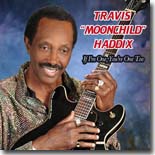 Travis “Moonchild” Haddix started out playing
piano as a youngster, but after seeing B. B. King
playing guitar one day at the Memphis radio station
WDIA, he soon switched to guitar. By the ’60s, he
had played with the D. L. Rocco Band and with Little
Johnny Taylor, and had even released a few singles
before starting his own group. In the late ’80s, he
signed with Atlanta’s Ichiban Records with the
assistance of label mate, Clarence Carter, and
recorded five albums. Since that time, Haddix has
recorded on his own Wann-Sonn Records and for Earwig
Records, improving with each subsequent release.
Travis “Moonchild” Haddix started out playing
piano as a youngster, but after seeing B. B. King
playing guitar one day at the Memphis radio station
WDIA, he soon switched to guitar. By the ’60s, he
had played with the D. L. Rocco Band and with Little
Johnny Taylor, and had even released a few singles
before starting his own group. In the late ’80s, he
signed with Atlanta’s Ichiban Records with the
assistance of label mate, Clarence Carter, and
recorded five albums. Since that time, Haddix has
recorded on his own Wann-Sonn Records and for Earwig
Records, improving with each subsequent release.
Haddix’s 17th release, If I’m One, You’re One Too
(Benevolent Blues), follows true to form, resulting
in his strongest effort yet. As always, Haddix wrote
all 12 tracks, all featuring his highly original and
unique outlook on life that will appeal to fans of
both soul blues and electric blues. A couple of the
tracks, notably the clever title track and “Hard To
Teach, Hard To Learn,” both mesh the blues over a
funk backdrop.
The opening track, “Scared Half To Death, Twice,”
describes the dangers of slipping around on your
mate and features a muscular horn section, along
with some funky wah-wah guitar. “Dollar’s Worth of
Gas” bemoans the tough economic times and just how
little $1 of gas will get you these days. “Getting
Old, The Alternative” catches Haddix musing on how
much better it is to age gracefully than it is to
stop aging completely.
There are also tracks devoted to the eternal
man/woman trials and tribulations, albeit with a
modern twist (“Clean Out of Love,” “Can’t Get You
Back,” “A Little Snack,” “Lump In My Throat”).
Closing the disc, in a first for Haddix, are a pair
of acoustic tracks featuring him solo on guitar,
“Who Are You Asking?,” and “It’s Rooster Again,” a
tribute to his father, Delta blues artist Chalmus
“Rooster” Haddix.
In addition to being a gifted songwriter, Haddix is
a fantastic guitarist in the tradition of B. B. King
and a singer that blends Bobby “Blue” Bland with
Little Milton. Given those qualities, not to mention
his exceptional catalog of recordings, it seems like
he should be even better known than he is.
Hopefully, If I’m One, You’re One Too will
remedy that situation.
--- Graham Clarke
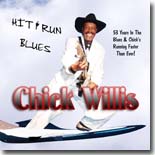 To some blues fans, Chick Willis may be
perceived as a “one trick pony,” given his
inclination over the years to ride the “Stoop Down”
bandwagon until the wheels fall off. However, that
would be unfair, because the 76-year-old Willis is a
remarkably diverse artist, as comfortable on the
straight blues and soul as he is with the more
ribald, novelty tracks he’s noted for. Hit & Run
Blues (Benevolent Blues) probably comes the
closest to capturing the real and complete Chick
Willis.
To some blues fans, Chick Willis may be
perceived as a “one trick pony,” given his
inclination over the years to ride the “Stoop Down”
bandwagon until the wheels fall off. However, that
would be unfair, because the 76-year-old Willis is a
remarkably diverse artist, as comfortable on the
straight blues and soul as he is with the more
ribald, novelty tracks he’s noted for. Hit & Run
Blues (Benevolent Blues) probably comes the
closest to capturing the real and complete Chick
Willis.
Over the years, Willis learned his lessons well,
touring in the late ’50s with his cousin, blues
legend Chuck Willis, the “King of the Stroll,”
working as his valet and chauffeur and playing in
his band. After his cousin died in 1958, Willis
worked with Elmore James and eventually on his own
before hitting it big with the 1972 release of
“Stoop Down Baby,” which managed to sell over 3
million copies via jukebox play, and despite never
being heard on the radio due to its risqué nature.
Though he’s managed to continue his career by
focusing on the risqué tracks on recordings for
Ichiban, Deep South, Paula, and Ifgam, he’s always
been an exceptional singer and
multi-instrumentalist, focusing on guitar.
Hit & Run Blues, like many of his more recent
releases, features Willis playing it straight and
dabbling in the ribald. There’s another visit to
“Stoop Down” territory with an update called “Stoop
Down Low,” plus “1, 2, 3, 4, 5 Shots of Whiskey,” a
new spin on the “caught my old lady cheating” theme,
“Country Lovin’ Man,” and “Houdini Lover.” Other
highlights include “Love To See You Smile,” “Recess
In Heaven,” and a live cut, “Blues Man,” that
appears at the end of the disc.
Willis also tackles a pair of Bobby “Blue” Bland
tunes (“Soul of A Man” and “Millionaire”) with
satisfying results, along with a remake of Merle
Haggard’s “Today I Started Loving You Again,” that
moves that country standard deep into R&B territory.
Though he is in his mid-70s, Willis has lost very
little, if any, of his vocal skills over time.
Willis gets plenty of help from a tight backing
band, a three-piece horn section, solid work on
Hammond B-3 from Bobby Felder, and some understated,
but strong backing vocals on most tracks, but it’s
still Willis’ show. He’s as strong and vital a blues
personality as ever and shows no signs of slowing
down in his 53rd year of making music. Hit & Run
Blues should please longtime fans and bring a
few new ones into the fold.
--- Graham Clarke
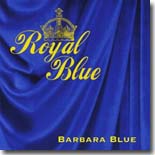 Willie Mitchell had promised Barbara Blue
that he would produce her next CD, an exciting
prospect for any singer to imagine, especially so
for one with the talent Ms. Blue possesses.
Unfortunately, Mitchell’s health began to fail and
he was unable to even start the project. He
eventually passed away in January of 2010. However,
all was not lost as Mitchell’s son, Lawrence “Boo”
Mitchell stepped in to assume production duties and
the project proceeded at Mitchell’s fabled Royal
Studios. The result, Royal Blue (Big Blue
Records), is like stepping back in time to the glory
days of Hi Records.
Willie Mitchell had promised Barbara Blue
that he would produce her next CD, an exciting
prospect for any singer to imagine, especially so
for one with the talent Ms. Blue possesses.
Unfortunately, Mitchell’s health began to fail and
he was unable to even start the project. He
eventually passed away in January of 2010. However,
all was not lost as Mitchell’s son, Lawrence “Boo”
Mitchell stepped in to assume production duties and
the project proceeded at Mitchell’s fabled Royal
Studios. The result, Royal Blue (Big Blue
Records), is like stepping back in time to the glory
days of Hi Records.
Ms. Blue is joined by a crack Memphis band with
roots to those storied days…..Lester Snell
(keyboards), Skip Pitts (lead and rhythm guitar),
Steve Potts (drums), and Dave Smith (bass), and you
can’t have a Memphis soul and blues recording
without a horn section (Lannie McMillan and Gary
Topper – tenor sax; Marc Franklin – trumpet; Jim
Spake – baritone sax). There’s also a boatload of
guest stars on various tracks, including Preston
Shannon on guitar, harmonica players Robert
“Nighthawk” Tooms and Brandon Bailey, Cody Dickenson
and his amazing electric washboard, and slide
guitarist Josh Roberts.
When those horns kick in on the opening tune,
“Beware,” you’ll feel the goose bumps starting if
you’re a fan of that old time Memphis soul. “Beware”
is one of many songs covered on Royal Blue with
origins in the Bluff City. Pitts breaks out the
waka-waka guitar for a tasty cover of Al Green’s
“Rhymes,” and Blue does a smooth-as-glass take of
Syl Johnson’s “Back For A Taste of Your Love.” Other
Memphis covers of note include “If I Could Reach
Out,” the O. V. Wright standard, “8 Men & 4 Women.”
Blue also penned several tracks on the disc,
including “Blue,” which sounds like it was penned
back in the day….a nice addition to the Memphis soul
catalog. “All You Got,” is a straight blues track
that teams Blue with Robert “Nighthawk” Tooms’
harmonica and Josh Roberts’ guitar. “Too Late”
features Preston Shannon on guitar.
Blue also re-invents a pair of familiar classics.
“Heartbreak Hotel” is transformed into a soul
number, complete with horns, background vocals, and
some sweet guitar licks, courtesy of Skip Pitts.
“Let’s Stay Together,” the Al Green classic, is
stripped down to Snell’s piano, McMillan’s tenor
sax, and Blue’s vocals.
Mitchell’s production is first-rate. Based on this
disc, it’s obvious that the future of Memphis blues
and soul is in good hands. “Poppa” would be proud of
his efforts. Come to think of it, he’d be proud of
Barbara Blue’s efforts, too. She continues to amaze
and impress with each release. If you’re in the
neighborhood, stop by and check Ms. Blue out at
Silky O’Sullivan’s, but if you can’t make it to
Memphis, pick up Royal Blue. It’s the next
best thing to being there.
--- Graham Clarke
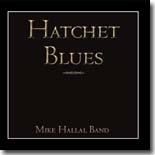 The Mike Hallal Band’s latest release,
Hatchet Blues, (Pi Records) picks up where their
previous release, the well-received Live At
Lizard Lounge, left off. Although recorded in
the studio this time around, the new album still has
that live-in-the-studio feel, and their powerful,
unvarnished blues/rock approach is still in place.
The Mike Hallal Band’s latest release,
Hatchet Blues, (Pi Records) picks up where their
previous release, the well-received Live At
Lizard Lounge, left off. Although recorded in
the studio this time around, the new album still has
that live-in-the-studio feel, and their powerful,
unvarnished blues/rock approach is still in place.
The standout tracks include the opening rocker,
“Skywriting,” which features guitar work from Doug
Batchelder (who also adds background vocals to
multiple tracks, and keyboards to the ballad, “Liv”),
“World’s A Place,” a topical song whose title is
borrowed from a phrase used in Barack Obama’s
autobiography, Dreams From My Father, and the
title track, an impressive nine-minute slow blues
that struggles between forgiving and forgetting and
revenge. Bass player Robert DeCorte wrote and sings
the Beatlesque “Last of the Great Train Robbers.
Four cover tunes are included, including two
lesser-known tunes from the ’30s. Charley Patton’s
“Poor Me,” one of the last songs he recorded gets
the full band treatment, and a modernized treatment
of Henry Townsend’s “Doctor Blues,” which the band
also covered on their previous live set. There’s
also a cover of Blind Joe Reynold’s “Outside Woman
Blues,” that sticks fairly close to Cream’s version,
and a typically rocked-out version of Don Nix’s
“Going Down.”
There’s also a bonus cut, a fun-filled and funky
“Levels Jam,” done off-the-cuff in the studio with
some sparkling interplay between the band members (Hallal
– vocals, guitar, Jim Antonellis – drums, Robert
DeCorte – bass, vocals, and the impressive Chris
Schluntz – lead guitar).
Hatchet Blues is another strong set roadhouse
blues and rock from the Mike Hallal Band. For more
information, check out the
band’s site.
--- Graham Clarke
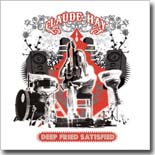 I have to confess that I listened to Deep Fried
Satisfied (Ingot Rock) about four times before I
realized that Claude Hay was playing all the
instruments himself. I was too busy playing
percussion on my steering wheel and nodding my head
to the music to even notice that this fantastic
music was being played by one man, but it is and
it’s unlike anything you’ve heard this year. The
Australian’s brand of blues incorporates plenty of
funk and world music into traditional blues. Think
of Muddy Waters fronting the P-Funk All Stars. Hay
does it all himself, from building his own
instruments to customizing his own van (that
includes a recording studio) to putting his own
music together.
I have to confess that I listened to Deep Fried
Satisfied (Ingot Rock) about four times before I
realized that Claude Hay was playing all the
instruments himself. I was too busy playing
percussion on my steering wheel and nodding my head
to the music to even notice that this fantastic
music was being played by one man, but it is and
it’s unlike anything you’ve heard this year. The
Australian’s brand of blues incorporates plenty of
funk and world music into traditional blues. Think
of Muddy Waters fronting the P-Funk All Stars. Hay
does it all himself, from building his own
instruments to customizing his own van (that
includes a recording studio) to putting his own
music together.
The inspiration for his latest release was his
addiction to junk food, which really came out during
his 2008 U.S. tour. The opening song, “Get Me Some”
recalls Hay’s love for New York-style pizza. Another
standout track, “How Can You Live With Yourself,”
has already given Hay a major hit on Australian
radio.
Other must-hear tracks include the infectious title
track, “Don’t Give Me That,” “On Hold,” and “Miss
You So,” written for his mother. Hay’s lyrics
capture modern situations in a unique manner and his
slide guitar mixes perfectly with the assorted funk
production values. He wrote 10 of the 11 songs, but
the 11th song is, appropriately…given his DIY
reputation, an “extreme makeover” of Queen’s “We
Will Rock You” that turns the original version on
its ear….to say the least. It would be neat to hear
his interpretation of other old songs on his future
releases.
Given Claude Hay’s talent, it’s guaranteed that
there will be future releases. In the meantime,
savor every morsel of Deep Fried Satisfied
and tell your friends about it.
--- Graham Clarke
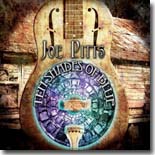 Ten Shades of Blue (Kijam Records) is Joe
Pitts’ seventh CD in ten years. The Arkansas
guitarist was first inspired by the guitar legends
of the ’60s and ’70s…….British stars like Eric
Clapton, Jeff Beck, and Jimmy Page as well as
Southern rockers like Duane Allman and Dickey Betts.
Like many fans his age, he traced his heroes’ music
back to the original source and discovered Son
House, Muddy Waters, Albert King, Freddie King, and
B. B. King.
Ten Shades of Blue (Kijam Records) is Joe
Pitts’ seventh CD in ten years. The Arkansas
guitarist was first inspired by the guitar legends
of the ’60s and ’70s…….British stars like Eric
Clapton, Jeff Beck, and Jimmy Page as well as
Southern rockers like Duane Allman and Dickey Betts.
Like many fans his age, he traced his heroes’ music
back to the original source and discovered Son
House, Muddy Waters, Albert King, Freddie King, and
B. B. King.
Ten Shades of Blue consists of ten cover
tunes from musicians who have inspired Pitts over
the years, from Muddy Waters (“Crosseyed Cat”) and
Elmore James (“I’m Worried”) to Luther Allison
(“Pain In The Streets”) and Walter Trout (“Clouds On
The Horizon”). There are also selections from Eric
Gales (“Freedom From My Demons”), John Mayall (“Walkin’
On Sunset”) and Peter Green (“The World Keeps On
Turning”).
Pitts is an excellent guitarist and moves seamlessly
from style to style on these tracks. His slide work
on “I’m Worried” is particularly impressive, but he
also excels on the moody minor key tracks like the
Gales track and A. D. Prestage’s “No Stranger To The
Blues” (originally done by the Kinsey Report).
There’s also a funky version of Albert Collins’ “Put
The Shoe On The Other Foot,” and John Mayall’s
swinging “Walkin’ On Sunset.”
Vocally, Pitts brings new life to these tracks with
his world-weary, soulful vocals, particularly on
“Freedom From My Demons,” the Memphis soul
masterpiece “Breaking Up Somebody’s Home,” and the
closer, an acoustic take on Peter Green’s “The World
Keeps On Turning.”
Ten Shades of Blue will be spending quite a
bit of time in my stereo. For fans of blues guitar,
this should be an essential purchase. Joe Pitts has
learned his craft well and obviously knows the blues
from beginning to end, as this disc proves.
--- Graham Clarke
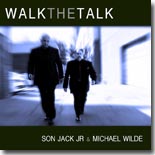 Son Jack Jr. returns with harpman
Michael
Wilde in tow for Walk The Talk, his third
release. This time around, there’s more focus on
electric blues than acoustic, but it’s still the
same approach to Delta blues that made his previous
two releases so noteworthy. In addition to Jack and
Wilde, other contributors include Eric Robert on
keyboards, Mark Davies on bass, and Billy Barner on
drums.
Son Jack Jr. returns with harpman
Michael
Wilde in tow for Walk The Talk, his third
release. This time around, there’s more focus on
electric blues than acoustic, but it’s still the
same approach to Delta blues that made his previous
two releases so noteworthy. In addition to Jack and
Wilde, other contributors include Eric Robert on
keyboards, Mark Davies on bass, and Billy Barner on
drums.
Eight of the 12 tracks are original compositions.
The title track opens the disc on a high note with
Jack contributing a swaggering vocal. Wilde’s
mournful harmonica is a highlight on “Crying Time,”
as are Robert’s keyboards. “Down So Low” is another
highlight, with Jack’s guitar taking on an almost
Hill Country quality mixing in with Robert’s punchy
keyboards. Wilde’s rollicking “Maximum Insecurity”
will remind listeners of those manic Sonny Terry
cuts from long ago.
Other standout tracks include a droning cover of
John Lee Hooker’s “Crawling Kingsnake,” “Requiem,” a
lovely acoustic guitar track, and a fiery remake of
Charley Patton’s “Pony Blues.” “Howlin’ Poppet” is
another fine Delta-influenced track that showcases
Jack’s Delta chops and Wilde’s harmonica together.
Fans of Delta blues, new and old, will enjoy this
disc. Jack and Wilde’s styles mesh perfectly
together, and this marvelous music, recorded in
Lynnwood, Washington, is as authentic as anything
you’ll hear coming out of the Mississippi delta.
--- Graham Clarke
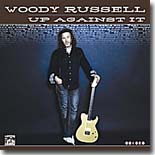 Texas guitarist Woody Russell’s fourth
release, Up Against It (CUTS Music Group), is
a fine mixture of blues and soul with an interesting
background. Russell offered this disc to his fans as
an “In Session Project,” where he allowed fans to
pre-order the disc to receive access to a “Behind
The Scenes” look at the making of the album….in real
time….from Russell’s website (www.woodyrussell.com).
So if a fan preordered, they were able to view
possibly the entire process of making the album from
beginning to end. A portion of the fans’ investment
was donated to Austin’s SIMS Foundation, which is a
mental health service provider for local musicians.
This successful endeavor was tagged by Russell as a
“fan investment business model,” and could serve as
an inspiration for future releases by independent
artists.
Texas guitarist Woody Russell’s fourth
release, Up Against It (CUTS Music Group), is
a fine mixture of blues and soul with an interesting
background. Russell offered this disc to his fans as
an “In Session Project,” where he allowed fans to
pre-order the disc to receive access to a “Behind
The Scenes” look at the making of the album….in real
time….from Russell’s website (www.woodyrussell.com).
So if a fan preordered, they were able to view
possibly the entire process of making the album from
beginning to end. A portion of the fans’ investment
was donated to Austin’s SIMS Foundation, which is a
mental health service provider for local musicians.
This successful endeavor was tagged by Russell as a
“fan investment business model,” and could serve as
an inspiration for future releases by independent
artists.
As for the music itself, Russell put as much effort
into the recording project as he did the business
model. He produced the disc, wrote all the songs,
engineered and mixed it, designed the cover, and
played nearly all the instruments. The opening
track, “Make It Tough On Me,” kicks things off in
fine fashion with Russell’s stinging guitar leads
bringing to mind Albert Collins at times. “That’s
Just The Way My Wheels Roll” is a Chicago-style
blues track with some strong harmonica from Jose
Ruiz, who plays on two other tracks as well. “They
Won’t Know What Hit Them” is a blues rocker and
“Under My Door” leans more toward the soul side,
with some smooth guitar.
“The Right Side of The Grass” is a more upbeat R&B
number with Russell laying down some falsetto vocals
and a pull-out-all-the-stops guitar solo at the end.
“Moonshine (For My Wounded Heart)” has an unusual
funky arrangement and vocal, while “Don’t Bring It
Home” and “The Things We Do” showcase Russell’s
diverse guitar work. The closer, “Between Nowhere
And Goodbye,” is an acoustic number that features
Russell’s best vocal performance on the disc.
Russell’s guitar work is exemplary and his vocals
alternate between fiery and soulful, sometimes
reminiscent of Jimmy Hall. He’s also a strong
composer with a unique perspective on the blues. In
addition to Ruiz, drummer Doug Marcis guests on a
pair of tracks, but otherwise it’s all Woody
Russell. If you like your blues with a touch of soul
and rock, Up Against It will be a satisfying
purchase.
--- Graham Clarke
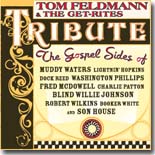 Tribute (Magnolia Recording Company) is the
latest release from Tom Feldmann & The Get-Rites.
It’s a salute to many of the artists that influenced
guitarist Feldmann, whose vision of the blues is
steeped in the gospel music of the late ’40s and
’50s. Though Feldmann does show reverence to these
old classic sides, his noteworthy slide guitar work,
as well as his interplay with the Get-Rites (drummer
Jed Staack, upright bassist Paul Liebenow, and pedal
steel guitarist Jed Germond) is thoroughly modern in
approach.
Tribute (Magnolia Recording Company) is the
latest release from Tom Feldmann & The Get-Rites.
It’s a salute to many of the artists that influenced
guitarist Feldmann, whose vision of the blues is
steeped in the gospel music of the late ’40s and
’50s. Though Feldmann does show reverence to these
old classic sides, his noteworthy slide guitar work,
as well as his interplay with the Get-Rites (drummer
Jed Staack, upright bassist Paul Liebenow, and pedal
steel guitarist Jed Germond) is thoroughly modern in
approach.
Feldmann covers ten songs previously recorded by
both secular and non-secular sources. Among the
secular artists covered are Muddy Waters (a spirited
“Live So God Can Use You”), Lightnin’ Hopkins (a
tender version of “Needed Time”), Charley Patton
(“Lord I’m Discouraged”) Bukka White (“I Am In The
Heavenly Way”), and Mississippi Fred McDowell (“The
Lord Will Make A Way”).
Religious artists covered include Washington
Phillips (“Leave It There”), Blind Willie Johnson
(“It’s Nobody’s Fault But Mine”), Robert Wilkins
(“Stand Your Test In Judgement”), and an eerie
version of Alabama singer Dock Reed’s “I’m Going
Home,” punctuated by Germond’s pedal steel.
Feldmann’s guitar work is superlative, and his
vocals are weathered and possess just the right
amount of grit and passion to get the job done. The
Get-Rites provide first-rate backing on the six
tracks on which they appear. Feldmann plays
unaccompanied on four tracks…..the Patton, Johnson,
and White tracks, plus the closer, a brief snippet
of “This Little Light of Mine,” attributed to Son
House, featuring some outstanding slide work.
The late Robert Ward once said that there was little
difference in blues and gospel (“…just substitute
‘baby’ and ‘Jesus’,” he once said in an interview).
While that may be oversimplifying things a bit, Tom
Feldmann & The Get-Rites provide ample proof that
there is a thin line of sorts between the two.
Tribute is a wonderfully played homage to some
legendary artists who walked that line with ease.
--- Graham Clarke
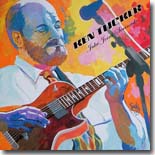 Ken Tucker has been playing guitar for 27
years, in styles ranging from Christian rock to
hip-hop to the blues. From the sound of his latest
CD for Benevolent Blues, Juke Joint Serenade,
it’s obvious that the blues are where his heart is,
and appropriately so. This new disc features a
powerful hard-rocking blues attack mixed with some
solid roots rock and even ventures into acoustic
blues territory.
Ken Tucker has been playing guitar for 27
years, in styles ranging from Christian rock to
hip-hop to the blues. From the sound of his latest
CD for Benevolent Blues, Juke Joint Serenade,
it’s obvious that the blues are where his heart is,
and appropriately so. This new disc features a
powerful hard-rocking blues attack mixed with some
solid roots rock and even ventures into acoustic
blues territory.
While Tucker’s guitar work is excellent, he also
possesses a rugged, gritty vocal style and is a
first-rate songwriter as well. Among the disc’s
standout tracks are the roadhouse rockers, “Brother
Whiskey,” “One Stop Man,” and “Street Walking
Woman.” Other memorable tracks include “Desperately
Need,” which has a Springsteen ’80s era vibe, the
scorching and fittingly titled “Let It Slide” (with
slide guitar courtesy of Jack “Spooky Foot”
Stevens), and the slow blues, “Highway 61.” The disc
closes with a pair of acoustic cuts that spotlight
Tucker’s songwriting, “Killer’s Mind,” and “Worst I
Ever Felt,” which features a co-lead vocal from
Kelly Adams.
Producer Tim Bushong also plays guitar, bass, drums,
and supplies background vocals on most of the
tracks, but also lending a hand are Adams, Stevens,
Mike Reid (keyboards, organs, background vocals),
Josh Hammond (harmonica), and Karen Harris (guitar
and background vocals).
Juke Joint Serenade is a powerful, intense
set of modern blues from a seasoned vet that will
please fans of hard-edged blues rock and roots
music. Years of honing his craft as a guitarist,
singer, and composer are about to pay big dividends
for Ken Tucker.
--- Graham Clarke
 Toronto guitarist Chris Antonik may not be a
familiar name to most blues fans, but he’s been
impressing Toronto blues fans for some time now as a
sideman, currently playing as part of a trio.
Antonik has now stepped forward and delivered a
dynamite debut solo recording that’s loaded with a
mix of traditional blues and powerful blues-rock.
Chris Antonik shows that the guitarist is a
gifted songwriter as well as guitarist.
Toronto guitarist Chris Antonik may not be a
familiar name to most blues fans, but he’s been
impressing Toronto blues fans for some time now as a
sideman, currently playing as part of a trio.
Antonik has now stepped forward and delivered a
dynamite debut solo recording that’s loaded with a
mix of traditional blues and powerful blues-rock.
Chris Antonik shows that the guitarist is a
gifted songwriter as well as guitarist.
Antonik’s songs deal with themes such as fixing
broken relationships, learning from mistakes, and
other related blues themes. The crisp opener, “More
To Give,” rolls along with a strong vocal by
keyboardist Josh Williams (Fat Cats), who supplies
the bulk of the vocals on the disc. Antonik shines
on slide guitar on “Roll With It.” “The King of
Infidelity” is a blues-pop tune in its arrangement,
and focuses on the consequences of stepping out on
your mate. “If We Start From Here,” teams Antonik
(playing some fat B. B. King-influenced licks) with
singer/harmonica player Mark “Bird” Stafford. A
haunting solo track with Antonik on dobro (“Dhyana”)
at the disc’s midpoint shows the guitarist’s
versatility.
Jerry Ragovoy’s “She’s A Burglar,” (the Freddie King
track from the ’70s) is a highlight, as Antonik rips
it up on guitar behind Williams’ fiery vocal. The
only other cover on the disc is Otis Rush’s "Double
Trouble," where Antonik makes his debut on lead
vocals. The remaining tracks include “Almost Free,”
which sounds like a funky ’70s southern blues-rocker
in the Wet Willie tradition, “Reap What You Sow,”
and “Persevering Kind,” a bouncy, optimistic track
featuring Henry Lees on vocals.
Chris Antonik is a surprising debut recording
with one highlight after another, thanks to Antonik
and his supporting cast of fellow Canadian blues
artists, who definitely came to play. If he
continues to improve in the vocal department,
Antonik is well on the way to becoming a triple
threat with his outstanding fretwork and imaginative
songwriting.
--- Graham Clarke
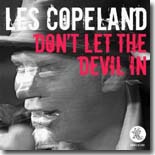 Guitarist Les Copeland started out playing
country blues when he launched his professional
career, but added music by guitarists as diverse as
jazz legend Wes Montgomery and the immortal Chuck
Berry. This expanded his repertoire considerably,
and now he’s as comfortable playing jazz, flamenco,
pop, and classical as he is with the blues. Don’t
Let The Devil In is Copeland’s debut recording
for Earwig Records, and it’s an exceptional
collection of acoustic and electric blues.
Guitarist Les Copeland started out playing
country blues when he launched his professional
career, but added music by guitarists as diverse as
jazz legend Wes Montgomery and the immortal Chuck
Berry. This expanded his repertoire considerably,
and now he’s as comfortable playing jazz, flamenco,
pop, and classical as he is with the blues. Don’t
Let The Devil In is Copeland’s debut recording
for Earwig Records, and it’s an exceptional
collection of acoustic and electric blues.
Copeland wrote 14 of the 15 tracks, including the
lovely “Distant Train,” “Ry Cooder,” a virtuosic
instrumental tribute to the influential guitarist,
“Riding The Sky Train,” a too-brief slide guitar
workout, “Long Lost Love,” which features some
intricate finger picking, and “Ginseng Girl” is a
plugged-in swinging blues instrumental. The poignant
closing track, “Crying For An Angel,” was written by
Copeland for his first daughter, who died a few days
after she was born.
Copeland is joined by Honeyboy Edwards for a pair of
tracks, a sturdy remake of Robert Nighthawk’s “Anna
Lee,” and the humorous “How’s That Drummer.” Earwig
Records founder and Honeyboy Edwards’ manager
Micheal Frank also adds some sweet harmonica to
three tracks, the country-tinged “What’s Your Name,”
“Silently,” and the ominous title track.
For fans of acoustic guitar, this disc is an
essential purchase. However, Don’t Let The Devil
In will appeal to music fans of all genres
because of Les Copeland’s amazing versatility. Don’t
miss this one.
--- Graham Clarke
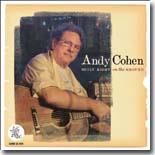 Andy Cohen is as close to a modern-day
troubadour as you’ll likely see these days. The
Memphis-based musician specializes in the
preservation and presentation of prewar blues, plus
folk and rags, from artists as far ranging as Woody
Guthrie, Memphis Minnie, Henry Spaulding, and Big
Bill Broonzy. In other words, Cohen brings music to
listeners that they probably would never hear
otherwise, which should make him a national
treasure.
Andy Cohen is as close to a modern-day
troubadour as you’ll likely see these days. The
Memphis-based musician specializes in the
preservation and presentation of prewar blues, plus
folk and rags, from artists as far ranging as Woody
Guthrie, Memphis Minnie, Henry Spaulding, and Big
Bill Broonzy. In other words, Cohen brings music to
listeners that they probably would never hear
otherwise, which should make him a national
treasure.
Cohen recently released Built Right on the Ground
on the Earwig record label. He dusts off 14 prewar
tunes, with songs from a diverse list of performers
like Teddy Darby (the sparkling title track), Jimmie
Rodgers (“My Old Pal” and “Miss The Mississippi and
You”), Jim Brewer (“Shake-A-You Boogie”), Meade Lux
Lewis (“Honky Tonk Train”), Sam McGee (“Railroad
Blues”), and Jelly Roll Morton (“Grandpa’s Spells”).
Broonzy’s “Mopper’s Blues” is a highlight, as are
the two Memphis Minnie covers (“Soo Cow Soo” and “Me
and My Chauffeur”).
Chances are that you will be introduced to some
blues songs that you’ve never heard before, and that
you will dig deeper to the sources to hear where the
music came from. That’s the best thing about this
disc…..that and Cohen’s relaxed performance. His
guitar work (and piano on two tracks – “Honky Tonk
Train” and the lone original track, “Jim Dickinson
Stomp”) is first-rate, of course, and his vocals are
warm and comfortable. He gets assistance on a couple
of tracks from his wife, Larkin Bryant, who plays
mandolin and shares vocals on the album closer, a
lovely version of Bobby Charles’ “Tennessee Blues.”
Kurt Anderson provides leads vocals on “My Old Pal”
and guitar on “Miss The Mississippi And You.”
Built Right on the Ground will be a fine
addition to any music lover’s collection. This is a
wonderful collection of rarely heard songs from the
early part of the 20th century. Thanks to Andy Cohen
for allowing them to see the light of day again.
--- Graham Clarke
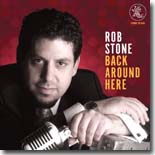 t’s been seven years since Rob Stone
recorded an album, but he hasn’t exactly been
sitting on his hands during that time. He’s been
playing assorted venues in Chicago and even has a
regular gig at the House of Blues in the Windy City.
He’s also appeared in support of his former C-Notes
bandmates, Chris James and Patrick Rynn, on their
two CDs for Earwig. James and Rynn return the favor
on Stone’s latest release for Earwig, Back Around
Here, a superlative set of modern Chicago blues
that sounds it sprang from the vintage days of Chess
Records.
t’s been seven years since Rob Stone
recorded an album, but he hasn’t exactly been
sitting on his hands during that time. He’s been
playing assorted venues in Chicago and even has a
regular gig at the House of Blues in the Windy City.
He’s also appeared in support of his former C-Notes
bandmates, Chris James and Patrick Rynn, on their
two CDs for Earwig. James and Rynn return the favor
on Stone’s latest release for Earwig, Back Around
Here, a superlative set of modern Chicago blues
that sounds it sprang from the vintage days of Chess
Records.
Stone wrote eight of the 12 tracks on Back Around
Here, and they include the rousing opener,
“You’re No Good For Me,” and the swinging title
track. “I Need To Plant A Money Tree” is a tough
Jimmy Reed-type shuffle, and “Can’t Turn Back The
Clock” is a swing track that spotlights piano man
Dave Maxwell and drummer Sam Lay. There’s also a
decidedly upbeat instrumental, “Dragon Killers,”
that shows why Stone is considered one of the best
harmonica players in the Windy City. Speaking of the
Windy City, “Chicago All Night” is a celebration of
the never-ending music scene.
The covers are all well-chosen and the highlight is
Magic Sam’s rarely-heard “Give Me Time,” which is
closer to R&B. John Lee Williamson’s “Love You For
Myself” is a more traditional blues with Aaron Moore
on piano. “Sloppy Drunk Blues” harkens back more to
the Leroy Carr original version than the more
familiar Jimmy Rogers version, and the “5” Royales’
“It’s Hard But It’s Fair” gets transformed from
doo-wop to horn-driven R&B.
Also contributing to Back Around Here are
drummers Willie “Big Eyes” Smith and Willie Hayes,
guitarists Michael Weisman and Jeff Stone, and sax
men Rodney Brown (tenor) and John Bowes (baritone).
If you’re a fan of Chicago blues, you will be
pleased with Rob Stone’s latest. Hopefully, it won’t
be another seven years before he returns to the
studio.
--- Graham Clarke
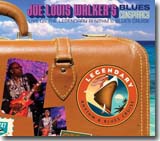 Joe Louis Walker’s third release for Stony
Plain, Blues Conspiracy: Live on the Legendary
Rhythm & Blues Cruise, is a sequel of sorts to
two earlier projects; his pair of Live at Slim’s
releases for Hightone in the late ’80s and his
Great Guitars disc released by Verve in the mid
’90s. Walker combines the live setting with the
guest artists on this release and the results are a
very enjoyable set of familiar tunes performed by
familiar artists.
Joe Louis Walker’s third release for Stony
Plain, Blues Conspiracy: Live on the Legendary
Rhythm & Blues Cruise, is a sequel of sorts to
two earlier projects; his pair of Live at Slim’s
releases for Hightone in the late ’80s and his
Great Guitars disc released by Verve in the mid
’90s. Walker combines the live setting with the
guest artists on this release and the results are a
very enjoyable set of familiar tunes performed by
familiar artists.
Walker tears through a fast-paced mix of his own
songs and a few choice cover tunes. The highlights
include Walker’s “car” song, “Slow Down GTO,” with
Mike Finnigan on organ, “Ain’t That Cold,” a slide
guitar fest with guitar legend Johnny Winter, and a
swinging version of “Eyes Like A Cat,” with Tommy
Castro, Deanna Bogart, Tom Poole, and Keith Crossan.
There’s also a blistering guitar duet with Kirk
Fletcher on “Ten More Shows To Play” (nice to hear
this one again), and Nick Gravenites’ “Born In
Chicago” gets the royal treatment with some
fire-breathing harmonica from Jason Ricci and guitar
from Paris Slim and Nick Moss. “Tell Me Why” is
another great guitar battle between Walker, Duke
Robillard, and Todd Sharpville.
John Lee Hooker’s “Sugar Mama,” which teams Walker
with Watermelon Slim on harmonica, has some nice
moments, and was probably a crowd pleaser in person,
but at nearly 12 minutes goes on a bit too long on
CD. Kenny Neal joins Walker for a stirring cover of
Junior Wells’ “Poor Man’s Plea,” and Walker’s own
“747” closes the disc with Tab Benoit and Paul
Nelson on guitars and Mitch Woods on the keys.
Walker and his band (Linwood Taylor – guitar, Henry
Oden – bass, Kevin Burton – keyboards, Jeff
Minnieweather – drums) provide solid backing on all
the tunes, and even get one track all to themselves,
a funky cover of J. J. Malone’s “It’s A Shame.”
If you’ve never had the opportunity to take one of
these blues cruises, Joe Louis Walker’s latest
effort will certainly get you that much closer to
making your reservation. This is a fun set that
sounds like it was as enjoyable to play as it must
have been to watch.
--- Graham Clarke
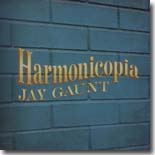 Harmonica ace Jay Gaunt is only 16 years ago
and is a player of amazing skill and diversity. He’s
comfortable playing any melody in blues, jazz, rock,
and pop. His latest release, Harmonicopia (JBG
Music LLC), is a set of astonishing depth and
breadth, with seven instrumentals that take in the
above mentioned styles, plus five blues tracks
featuring the vocals of Victor Wainwright. The disc
was recorded at Willie Mitchell’s Royal Studio in
Memphis and was produced by Lawrence “Boo” Mitchell
and Charley Burch.
Harmonica ace Jay Gaunt is only 16 years ago
and is a player of amazing skill and diversity. He’s
comfortable playing any melody in blues, jazz, rock,
and pop. His latest release, Harmonicopia (JBG
Music LLC), is a set of astonishing depth and
breadth, with seven instrumentals that take in the
above mentioned styles, plus five blues tracks
featuring the vocals of Victor Wainwright. The disc
was recorded at Willie Mitchell’s Royal Studio in
Memphis and was produced by Lawrence “Boo” Mitchell
and Charley Burch.
Kicking things off is a greasy version of Eddie
Harris’ “Listen Here,” that drips with Memphis soul.
Gaunt replaces the tenor sax of the original with
his harmonica (supported by the Royal Horns). Gregg
Allman’s “Midnight Rider” is another highlight,
featuring stellar support from Memphis guitar legend
Skip Pitts and the Memphis Strings, with Gaunt’s
harmonica replacing Allman’s vocal. Wainwright makes
his first appearance on vocals on Bobby Charles’ New
Orleans R&B standard, “Why Are People Like That?”
The tune also features some outstanding slide guitar
work by Josh Roberts.
Muddy Waters’ “Louisiana Blues” drips with sweaty,
swampy atmosphere with Gaunt doing his best Little
Walter, along with Wainwright’s understated vocal,
the electric washboard of Cody Dickinson, and Dave
Cousar’s slide. Producer Charley Burch wrote “Devil
Dealt The Blues,” a shuffle in the Jimmy Reed
tradition, and “Home of the Blues,” a tribute to the
Bluff City.
Next up is a surprisingly hip version of “Greensleeves,”
definitely not standard fare for a blues album, but
here it’s presented as a jazzy shuffle. “Double
Shuffle” is another instrumental, featuring Gaunt
and fellow harmonica player Brandon Bailey
exchanging licks, playing in unison, and even
head-to-head.
The closer, Peter Green’s “Rattlesnake Shake,” wraps
things up in fine fashion and features Gaunt along
with another solid Wainwright vocal, the twin guitar
attack of Pitts and Roberts, and Dickinson’s
electric washboard.
If harmonica blues is your bag, then look no
further. You’ve found the disc that will fulfill
your needs. Harmonicopia is a well-balanced
and invigorating set that you’ll listen to over and
over again. Jay Gaunt is going to be making some
beautiful music for a long time.
--- Graham Clarke
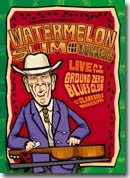 Watermelon Slim and The Workers have taken
the blues world by storm over the past few years.
Slim (AKA Bill Homans) has received a record 16
Blues Music Award nominations in the last four
years. More recently, Slim has ventured over to the
country side of blues with his last couple of
releases, but NorthernBlues Music has released a DVD
of a masterful performance by Slim and the band at
the Ground Zero Blues Club in Clarksdale, MS from
2007.
Watermelon Slim and The Workers have taken
the blues world by storm over the past few years.
Slim (AKA Bill Homans) has received a record 16
Blues Music Award nominations in the last four
years. More recently, Slim has ventured over to the
country side of blues with his last couple of
releases, but NorthernBlues Music has released a DVD
of a masterful performance by Slim and the band at
the Ground Zero Blues Club in Clarksdale, MS from
2007.
Live At the Ground Zero Blues Club captures
the band in an ideal setting, with an enthusiastic
crowd. There are 16 tracks on the DVD, with a lot of
songs from Slim’s first four albums (Big Shoes To
Fill, Up Close & Personal, Watermelon
Slim and the Workers, and The Wheel Man),
plus some often performed/never recorded gems (“My
Babe,” “You Ain’t Gonna Worry My Life No More,”
“Long Distance Call”).
Slim’s work on the dobro is second-to-none, as is
his harmonica, and his craggly, weathered vocals are
perfect. The Workers (Ronnie McMullen, Jr. – guitar,
Michael Newberry – drums, Cliff Belcher – bass) are
rock solid in support. There are also a few guest
stars involved, including guitarist Jimbo Mathus
(“Peaches,” Who’s Gonna Pay?” and “My Babe”),
Charlie Musselwhite (“Buick Fifty-Nine”) and the
sartorially splendid Big George Brock, who takes the
vocal on Little Walter’s “My Babe,” and Slim’s
“Who’s Gonna Pay?”
The DVD production is simply incredible. The picture
and sound are so clear; it’s almost like being there
in person. The special features included on the disc
are also worth a look. There’s an interview with
Slim by Chip Eagle of Blues Revue and Blues Wax, an
introduction to the Workers, and a couple of
behind-the-scenes glimpses of Slim at the club.
Live At the Ground Zero Blues Club provides
an interesting look at one of the driving forces on
the current blues scene and is well worth checking
out. If you’ve never experienced the force of nature
that is Watermelon Slim, this is a mighty fine place
to start.
--- Graham Clarke
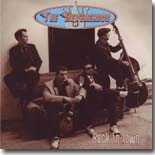 Back In Town is something different from
The Reverendos, a band based in the Basque
region of Spain. I have to admit that I hadn’t heard
of this band until I received their CD, but
listening to their music is refreshing and
reinforces the thought that the blues is alive and
well in Spain.
Back In Town is something different from
The Reverendos, a band based in the Basque
region of Spain. I have to admit that I hadn’t heard
of this band until I received their CD, but
listening to their music is refreshing and
reinforces the thought that the blues is alive and
well in Spain.
This nine track self-produced CD draws on a variety
of influences and the band provides a jump-blues and
rhythm & blues flavour to their work. There are two
very good original tracks written by the band
members, and a variety of covers by Muddy Waters,
Arthur Crudup, Leroy Carr, Elmore James, and
Lennon/McCartney!
The CD opens with an original track, “Mr.T-Bone,” an
instrumental written by the band, a good jump blues
with a lively tempo, and a good way to open the
album and to show what the band are all about. It’s
followed up by Muddy’s “She Moves Me,” given a
different tempo and flavour with the band stamping
their own signature on it. The speed lifts a bit
more with a fantastic version of Arthur Crudup’s
“That’s Alright,” one of the best cover versions of
this track that I’ve heard for a long time.
The band slows down for another original, “My Way Of
Loving,” a track that shows they can write as well
as play – how does a band from Spain write such good
lyrics in English?
“Just Can’t Hold On,” an Elmore James song, speeds
things up a little, and then runs into “One More
Time,” keeping the tempo at a similar pace before
lifting a bit with a good driving blues, “Shot
Down,” which was written by Gerry Roslie of The
Sonics.
When I saw “Can’t Buy Me Love” (Beatles) listed on
the CD cover, I wasn’t too sure what to expect or
why the track was there. However, the band gives the
song a jump-blues/Stray Cats type flavour and it
really works.
The CD closes with an old favourite of mine, Leory
Carr’s “How Long Blues” – it’s well-performed and a
great way to close the album, showcasing some very
inspired guitar work by band member Alvaro King.
Well worth a listen!
--- Terry Clear
 I first heard about The Roland Bowling Band
from Dorothy Ellis (Miss Blues), who is pretty good
at spotting talent in the blues music scene. Dorothy
suggested to Roland that he send me his CD,
Redemption (Baconpilot Records) and I’m pleased
that he did, as it contains some fantastic music.
Oklahoma based Roland is a 60-year-old Vietnam
veteran, suffering from colon cancer, so he knows a
bit about feeling the blues and he writes some
excellent songs.
I first heard about The Roland Bowling Band
from Dorothy Ellis (Miss Blues), who is pretty good
at spotting talent in the blues music scene. Dorothy
suggested to Roland that he send me his CD,
Redemption (Baconpilot Records) and I’m pleased
that he did, as it contains some fantastic music.
Oklahoma based Roland is a 60-year-old Vietnam
veteran, suffering from colon cancer, so he knows a
bit about feeling the blues and he writes some
excellent songs.
This 2009 recorded CD opens with “Old Man” - respect
for an older generation and possibly biographical
referring to Roland’s father. It’s the first of ten
tracks, all of them written by Roland, and played by
a trio of Roland on guitar and vocals, assisted by
Vegas on bass (a student of Tommy Shannon) and
Slammin’ Dan on drums. In addition, track 10,
“Everlasting,” features Obadiah Stephen Bowling on
acoustic guitar – I’m guessing that this is probably
Roland’s son, although the CD notes don’t say.
The medium tempo of the opening tracks stays in
place for “Things Changed” before slowing down to a
moody instrumental, “Utopia,” showcasing some
excellent guitar work by Roland Bowling, with a lot
of Jimi Hendrix influence in it. Obviously, from
this, Bowling was (like a lot of his generation) a
Hendrix fan and has studied the man’s music closely.
The tempo lifts again with “Mystery,” a song about a
beautiful, mysterious woman, and stays there with
“Cajun Love,” all about a trip to Louisiana to find
a Cajun girl. This is a really well-written track
with a lot of melodious guitar work – it puts me in
mind, just a little, of the work that Creedence
Clearwater Revival did in the 1970s.
Things slow down just a bit with track 6, “Rentiesville.”
I Googled Rentiesville and found that it’s a small
town in Oklahoma (population in 2000 was 102). A
blues singer, D.C. Minner, was born in Rentiesville.
He owned the Down Home Blues Club in Rentiesville,
where he and his wife Selby Minner held a
long-running annual blues festival, the 'Dusk 'til
Dawn Blues Festival', so I can only guess that
Bowling visited the area and fell in love with the
place.
“If I Beg” comes next, with some interesting guitar
riffs, and then the lovely “Songbird,” a track
written by Roland Bowling as a tribute to Miss Blues
(Dorothy Ellis), another Oklahoma resident. To me,
it pinpoints Miss Blues’ performances exactly, even
describing the way that she sits down to sing on
stage. Again, some Hendrix influence on the guitar
work shines through here.
The tempo lifts again with “Take The Blues Away”
before settling down to the last track,
“Everlasting,” which as I mentioned earlier has
Obadiah Stephen Bowling on acoustic guitar.
Although a lot of these tracks have Hendrix
influenced guitar, it’s not obtrusive, and it’s more
than made up for by the well-written songs.
--- Terry Clear